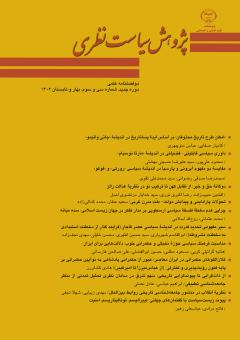چرایی عدم سلطۀ فلسفۀ سیاسی ارسطویی بر مدار تفکر در جهان زیست اسلامی، سده میانه
محورهای موضوعی : پژوهش سیاست نظری
محمد عثمانی
1
,
روحالله اسلامی
2
![]()
1 - دانشجوی دکتری علوم سیاسی گرایش اندیشه سیاسی، دانشگاه فردوسی مشهد
2 - استادیار گروه علوم سیاسی، دانشگاه فردوسی مشهد
کلید واژه: تمدن اسلامی, افلاطونگرایی, ارسطوگرایی, فلسفه سیاسی و حکومتاندیشی. ,
چکیده مقاله :
تدوین تمدن اسلامی در قرن دوم هجری با انتقال علوم مختلف از یونان به تمدن ایرانی و از آنجا به جهان اسلام همراه بود. این تمدن در فرآیند برسازی ساختارهای عینی، چونان حکومت، پشتوانه¬های ذهنی خود را از یونان و فلسفه افلاطونی و ارسطویی برگرفت. در این مسیر به دلیل ویژگی¬های فرهنگ عربی و عناصر دینی آن و نیز تجربه ایران¬شهری که در حال انتقال به جهان زیست اسلامی بود، فلسفه افلاطونی و افلاطون¬گرایی با اتکا به امر متافیزیکی مورد توجه قرار گرفت؛ در حالی که فلسفه ارسطویی که به واقعیت¬گرایی نزدیک است، در عرصه حکومت¬¬اندیشی مورد اغفال قرار گرفت. بدین معنا که دشواره¬های امر سیاسی در برسازی حکومت¬اندیشی جهان زیست اسلامی از مدار فلسفه ارسطویی اندیشیده نشد؛ بلکه از زاویه فلسفه سیاسی افلاطونی مورد تأمل واقع شد. از این چشم¬انداز، سؤال مطرح این است که چرا فلسفه سیاسی ارسطویی در این فرآیند مورد بی¬توجهی قرار گرفت؟ در صورت توجه به فلسفه سیاسی ارسطویی، ساخت¬های عینی برساخته تمدن اسلامی چگونه سازمان¬دهی میشدند؟ فرضیۀ¬ مطرح در این مقاله این است که در تمدن اسلامی، ساخت¬ها و سازههایی ذهنی و عینی وجود داشت که باعث به حاشیه رفتن فلسفه سیاسی ارسطویی شد. سازه¬های فکری چونان دوگانگی ذهنی همراه با سلطه انگاره¬های دینی باعث تجلی ساخت¬هایی متأثر از این تصور در عرصه سیاسی شد. اندیشه دینی و انگاره¬های اسطوره¬ای، عامل بنیادین گرایش به افلاطون¬گرایی برای اندیشیدن امر سیاسی و ساختار حکومتی بود. البته تجربه حکومت¬اندیشی در جهان زیست ایرانی دوره ساسانی که نوافلاطون¬گرایی، پشتوانه فکری حل دشواره¬های سیاسی قرار گرفته بود نیز به¬مثابه یک الگو در اندیشیدن دشوارههای اجتماعی مورد اقبال مسلمانان قرار گرفت. اما در مقابل فلسفه ارسطویی چون مبتنی بر واقعیت¬های اجتماعی و رویکرد عقلانی استوار بود، در این فرآیند به حاشیه رفت. بدین منظور ما با رهیافت روش تفسیری ویتگنشتاین به تحلیل موضوع می¬پردازیم.
Islamic civilization in the second century AH was accompanied by the transfer of various sciences from Greece to Iranian civilization and from there to the Islamic world. In the process of the construction of objective structures, such as the government, it took its mental support from Greece and Plato and Aristotelian philosophy. Along the way, because of the characteristics of Arab culture and its religious elements, as well as the experience of Iranshahr that was being transmitted to the Islamic world, Plato's philosophy and apostasy were taken into account on the metaphysical basis, while Aristotelian philosophy, which is close to realism, became a state of thought. That is to say, the difficulties of the political are not thought of in the orbit of Aristotelian philosophy, but from the point of view of Platonic political philosophy. From this perspective, the question is why was the political philosophy in the process ignored? How would the objective structures of Islamic civilization be organized if Aristotelian political philosophy? The hypothesis in this article is that in Islamic civilization, there were subjective structures and structures that marginalized Aristotelian political philosophy. Intellectual structures such as mental duality, along with the domination of religious ideas, led to the manifestation of structures influenced by this notion in the political arena. Religious thought and mythical ideas were a fundamental factor in the tendency to think about the political and government structure. Of course, the experience of governing in the Iranian life of the Sassanid era, where neo-lauretism was the intellectual support of solving political difficulties, was also favored by Muslims as a model for thinking of social hardships. But on the contrary, Aristotelian philosophy, based on social realities and rational approach, was marginalized in the process. To this end, we analyze the subject with the Wittgenstein Interpretative Approach.
